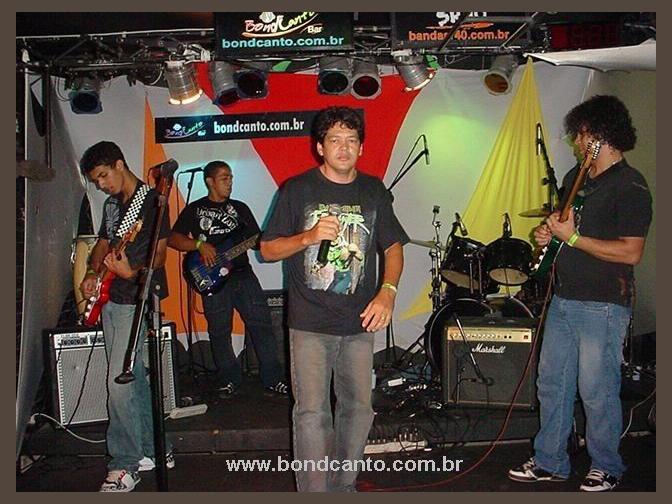 Os Tonhos
Os Tonhos
Os Tonhos: The Eccentric Band Behind "Jegue Doidão"
In the vibrant musical tapestry of Brazil, a peculiar band emerged from the eccentric city of Campina Grande: Os Tonhos. Their raucous, infectious sound, epitomized by the iconic anthem "Jegue Doidão," catapulted them to fame while stirring up a storm of controversy.
The Tonhos' Humble Beginnings
Os Tonhos' story began in the 1980s when four friends from humble backgrounds, Sivuca, Enok, Birrinha, and Pentecoste, bonded over their shared love for forró, a traditional Brazilian dance genre. They formed a band, initially known as "Forró do Birrinha," but soon adopted the moniker "Os Tonhos."
The Birth of "Jegue Doidão"
In 1995, the band released their debut album, "Arre égua!," featuring the infectious "Jegue Doidão." The song's raucous lyrics, which playfully describe a runaway donkey, resonated with listeners across the country. Its catchy melody and dance-inducing rhythm quickly spread like wildfire, making Os Tonhos a household name.
Controversy and Acclaim
"Jegue Doidão" brought Os Tonhos immense popularity, but it also sparked controversy. Some critics denounced the song's vulgar lyrics and perceived lack of musical sophistication. However, countless fans embraced the band's irreverent humor and raw energy. Os Tonhos became a symbol of the country's vibrant popular culture and the spirit of rebellion that characterized its marginalized communities.
Musical Evolution and Later Career
Throughout the years, Os Tonhos expanded their musical horizons while staying true to their forró roots. They experimented with different rhythms and styles, incorporating elements of reggae, rock, and hip-hop into their sound. The band released numerous albums, including "É o bicho" (1998), "Tonho doido" (2002), and "A volta do jegue" (2010).
Band Members
* Sivuca (Severino Alves do Nascimento): Lead vocals, accordion
* Enok (Enoque Nascimento do Vale): Triangle, vocals
* Birrinha (Josivan Ferreira de Sousa): Vocals, Zabumba
* Pentecoste (José Ribamar Nascimento): Guitar, vocals
* Macaco (Antônio Carlos de Sousa): Saxophone (later joined the band)
Legacy and Impact
Os Tonhos' influence extends far beyond their catchy tunes. They played a pivotal role in popularizing forró and bringing it to a wider audience. Their irreverent spirit and ability to connect with the common man made them icons of Brazilian popular culture.
Today, Os Tonhos continue to perform, entertaining their loyal fanbase with their infectious energy and timeless hits. Their song "Jegue Doidão" remains an anthem of the Brazilian working class and a testament to the enduring power of music in shaping cultural identity.
In the vibrant musical tapestry of Brazil, a peculiar band emerged from the eccentric city of Campina Grande: Os Tonhos. Their raucous, infectious sound, epitomized by the iconic anthem "Jegue Doidão," catapulted them to fame while stirring up a storm of controversy.
The Tonhos' Humble Beginnings
Os Tonhos' story began in the 1980s when four friends from humble backgrounds, Sivuca, Enok, Birrinha, and Pentecoste, bonded over their shared love for forró, a traditional Brazilian dance genre. They formed a band, initially known as "Forró do Birrinha," but soon adopted the moniker "Os Tonhos."
The Birth of "Jegue Doidão"
In 1995, the band released their debut album, "Arre égua!," featuring the infectious "Jegue Doidão." The song's raucous lyrics, which playfully describe a runaway donkey, resonated with listeners across the country. Its catchy melody and dance-inducing rhythm quickly spread like wildfire, making Os Tonhos a household name.
Controversy and Acclaim
"Jegue Doidão" brought Os Tonhos immense popularity, but it also sparked controversy. Some critics denounced the song's vulgar lyrics and perceived lack of musical sophistication. However, countless fans embraced the band's irreverent humor and raw energy. Os Tonhos became a symbol of the country's vibrant popular culture and the spirit of rebellion that characterized its marginalized communities.
Musical Evolution and Later Career
Throughout the years, Os Tonhos expanded their musical horizons while staying true to their forró roots. They experimented with different rhythms and styles, incorporating elements of reggae, rock, and hip-hop into their sound. The band released numerous albums, including "É o bicho" (1998), "Tonho doido" (2002), and "A volta do jegue" (2010).
Band Members
* Sivuca (Severino Alves do Nascimento): Lead vocals, accordion
* Enok (Enoque Nascimento do Vale): Triangle, vocals
* Birrinha (Josivan Ferreira de Sousa): Vocals, Zabumba
* Pentecoste (José Ribamar Nascimento): Guitar, vocals
* Macaco (Antônio Carlos de Sousa): Saxophone (later joined the band)
Legacy and Impact
Os Tonhos' influence extends far beyond their catchy tunes. They played a pivotal role in popularizing forró and bringing it to a wider audience. Their irreverent spirit and ability to connect with the common man made them icons of Brazilian popular culture.
Today, Os Tonhos continue to perform, entertaining their loyal fanbase with their infectious energy and timeless hits. Their song "Jegue Doidão" remains an anthem of the Brazilian working class and a testament to the enduring power of music in shaping cultural identity.